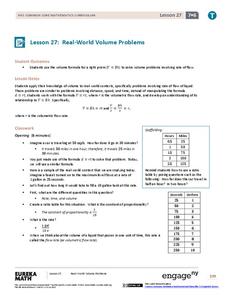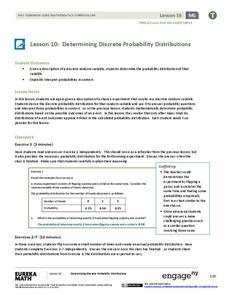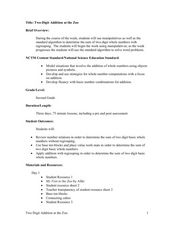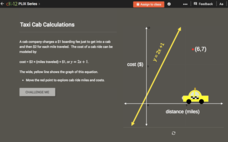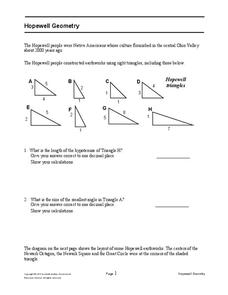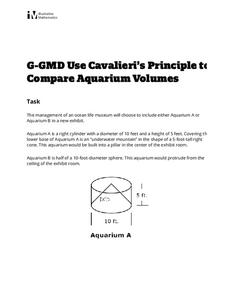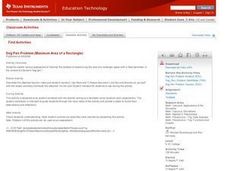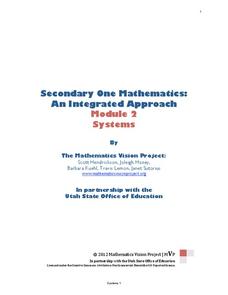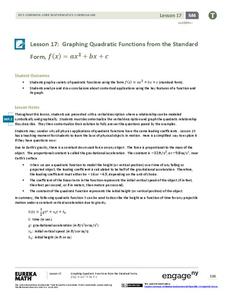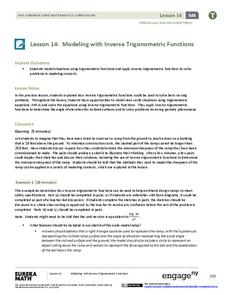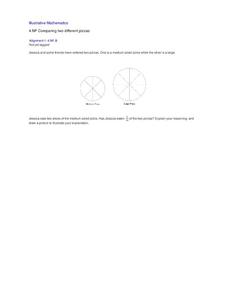EngageNY
Graphing Quadratic Functions from Factored Form
How do you graph a quadratic function efficiently? Explore graphing quadratic functions by writing in intercept form with a lesson that makes a strong connection to the symmetry of the graph and its key features before individuals write...
EngageNY
Real-World Volume Problems
How long does it take to fill a typical swimming pool? Prepare your pupils to answer similar questions using the 28th lesson in the 29-part module. The engaging lesson asks individuals to solve problems connected to the flow rate. All...
EngageNY
Interpreting Graphs of Proportional Relationships
What do those points on the graph mean? The 10th instructional activity in a series of 22 presents proportional relationships as graphs. Class members interpret various points of the graph — including the origin — within the context of...
EngageNY
Determining Discrete Probability Distributions 2
Investigate how long-run outcomes approach the calculated probability distribution. The 10th installment of a 21-part module continues work on probability distributions from the previous lesson. They pool class data to see how conducting...
Curated OER
Two-Digit Addition at the Zoo
Your second graders explore two digit addition with regrouping. They will investigate problem solving strategies within the context of a trip to the zoo. Multiple resources and assessments are provided.
EngageNY
Probability Rules (part 2)
Ensure your pupils are rule followers! Learners add the addition rule to the set of probability rules examined in the previous lesson. Problems require both the multiplication and addition rule.
Illustrative Mathematics
Plastic Building Blocks
Let's build a castle! Dennis and Cody have big plans, but do they have enough blocks between the two of them to accomplish their goal? A great context that requires students to add and compare mixed numbers. Encourage the use of pictures...
Illustrative Mathematics
Foxes and Rabbits 3
Model periodic populations. Here, in the context of foxes and rabbits, pupils look at graphs of the populations of these animals in a national park over a span of 24 months. Groups analyze the graphs and determine trigonometric...
CK-12 Foundation
Checking Solutions to Equations: Taxi Cab Calculations
Ride to success in checking solutions to equations. Scholars use an interactive graph to identify points that are solutions to a linear equation. Interpreting these points in terms of the context completes the activity.
Willow Tree
Extremes, Range, and Quartiles
The middle of the data is important, but what about the rest of it? The lesson plan shows learners the importance of the range, quartiles, and extreme values. Pupils practice finding each of these values from given data sets.
Mathematics Assessment Project
Hopewell Geometry
Right triangles from 2,000 years ago? Learners investigate different right triangles found in the earthworks of the Hopewell people, a Native American culture that populated the United States from 200BC to AD 500. Learners apply concepts...
Illustrative Mathematics
Use Cavalieri’s Principle to Compare Aquarium Volumes
Learners are designing a stunning new water feature for an aquarium, but they soon discover that more than just a pretty home for their fishy friends is required. From calculating the volume of a composite shape through the...
Curated OER
Math Words with Multiple Meanings
Learners of many ages use the Visual Thesaurus to help them understand the language of math. They work in groups to explore the multiple meanings of common math terms. Pupils come up with examples of the words in mathematical and other...
Scholastic
Study Jams! + and - Without Regrouping
Addition and subtraction are essential skills for all young mathematicians. Explain the step-by-step process with respect to place value using these real-world examples. Focus is on numbers in the tens, hundreds, and thousands, making...
Curated OER
Dog Pen Problem
Teach your class about various approaches to solving the problem of maximizing the area of a rectangle space with a fixed perimeter in the context of a farmer's dog pen. Then, they complete a worksheet independently to summarize the...
University of Utah
Representations of a Line
Line up to learn about lines! Scholars discover how to express patterns as linear functions. The workbook then covers how to graph and write linear equations in slope-intercept form, as well as how to write equations of...
Mathematics Vision Project
Module 2: Systems of Equations and Inequalities
The brother-sister pair Carlos and Clarita need your class's help in developing their new pet sitting business. Through a variety of scenarios and concerns presented to the siblings, the learners thoroughly explore systems of equations...
EngageNY
Graphing Quadratic Functions from the Standard Form
Use context to explain the importance of the key features of a graph. When context is introduced, the domain and range have meaning, which enhances understanding. Pupils use application questions to explore the key features of the graph...
Curated OER
Jon and Charlie's Run
Let's use math to solve an argument. Jon and Charlie are debating about who can run farther, but who is right? That's what your class will figure out as they apply their understanding of fractions to this real-life situation. A simple,...
EngageNY
Fair Games
What constitutes a fair game? Scholars learn about fair games and analyze some to see if they are fair. They extend this idea to warranties and other contexts.
EngageNY
Modeling with Inverse Trigonometric Functions 2
Use inverse trigonometric functions to work with ramps, rabbits, and Talladega. The class models real-world situations with trigonometric functions and solves them using inverses in the 15th installment of a 16-part series. Pupils solve...
Illustrative Mathematics
Margie Buys Apples
One of the most common, everyday applications of math is dealing with money. This single problem calculating how much change Margie receives is more involved than it appears at first glance. An understanding of how fractions and decimals...
EngageNY
Rational and Irrational Numbers
Back to the basics: learning how to add numbers. The 17th installment of a 35-part module first reviews addition techniques for rational numbers, such as graphical methods (number line) and numerical methods (standard algorithm). It goes...
Illustrative Mathematics
Comparing Two Different Pizzas
What better way to learn about fractions than with a couple pizzas? Help Jessica figure out how much of the pizza she has eaten, while teaching your class that fractions refer to a specific whole amount. This problem will be challenging...

